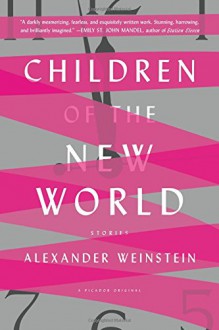
Fans of the show
Black Mirror are bound to find something to like in Weinstein’s collection of stories. Each of these stories has something to do with technology, whether that be humanity’s reliance on it, the ways in which it warps our interactions with each other, or how we deal with a sudden loss of it.
Some of the stories do cross the line into the bizarre, especially the ones where technology affects the way people have sex, and one in particular where people can add additional genitals to various parts of their bodies in order to continually amp up the sexual experience. There are also plenty of dark themes and situations in which people are pushed to their most desperate of limits. Weinstein explores that breaking point, and looks into how far people might go to fix things, hinting at some pretty awful things but never spelling it out for readers.
But there are also some really touching moments showing how, when the shit really hits the fan, people from the other side of whatever the relevant divide might be, will still reach out a helping hand to other humans in distress.
The rest of this review can be found HERE!___________________________________
-- Pre-review Breakdown --
Saying Goodbye to Yang - 5/5This one had me in tears... a feat for a story that is only 22 pages long.
- Not realising how much you love something until it's gone
- Misjudging someone who's on the other side of a major societal norm from you
- In the end, people comforting people, because although we make different choices and have very different opinions, a loss is still a loss. And a hurting person deserves comfort from another human being.
The Cartographers - 4.75/5Haha, who am I kidding? This is so very nearly 5 that I should just give it that, but after how much the first story wrecked me, I can't quite justify it. Great story, slow build, chilling. Though very close to some plots I've watched or read before, it was artfully done.
- Addiction
- Manufactured memories
Heartland - 3.5/5The author definitely has a way with words, and in this one he paints a stark vision in which resources are becoming more and more scarce and making ends meet is a near-impossibility.
He uses words that don't so much say the horrible things, but in a way that the reader
knows.
A little less to this story, and it feels almost as though the whole point of it was to get to that end paragraph, and without the rest of it, the reader wouldn't have been able to read between his lines.
Excerpts from The New World Authorized Dictionary - (No Rating)I don't feel I am in the right place to judge this one before finishing the book. It's a collection of definitions accompanied by examples of their uses within the world of the book. One hints at a connection to The Cartographers (story #2), so it stands to reason that the others might do the same for the rest of the book.
There was one definition (and accompanying reference) that was SO close to a Black Mirror element that it's rather eerie.
Moksha - 3.5/5Again, a well-told story, about a world where meditation and enlightenment are illegal, and people seek ways to find enlightenment through electronic means, for 15,000 rupee or more.
Children of the New World - 5/5Raw and emotional and well told and engaging.
This takes a closer look, again, at relationships with those who "aren't real" and takes a chilling look at online viruses and just how much our "data" can really mean to us.
Fall Line - 3.5/5Everything is filmed and streamed on a site called The Third Eye by contact lenses people wear. Snow is melting all the world over, and washed-up extreme skier Ronnie Hawks contemplates his choices between living fast and wild or dwindling into mediocrity.
A Brief History of the Failed Revolution - (No Rating)Another of those not-really-a-story stories, in which there are lot of references that feel as though they relate to another story, but don't do much on their own.
Migration - 3.5/5This one starts out rather bizarrely but has a heart-warming moment towards the end.
In a world where no one has ventured outside in years and everyone goes about their daily lives online, complete with body-suits that allow them to experience sex in that virtual world in a way like never before, the kid who wants to go outside and do things in the real world is the one they're worried about.
The Pyramid and the Ass - 4/5Another one that has a rather bizarre sexual element to it, but in which reincarnation has been perfected into a science people pay big bucks for, and the Dalai Lama is seen as a terrorist.
The ending of the story didn't seem to fit in with the main character's goal.
Rocket Night - 5/5Every year, a child from each school is launched into space. They're always the loners or the most annoying of the year, and the voice of the story is rather chilling in its coldness.
Openness - 4/5An exploration of how technology changes our interactions and might take over normal conversation in the future, and how vocalisations might become old-school.
Ice Age - 3.5/5In a future where an Ice Age has taken many lives and evicted people from their homes. A look at how desperation can lead to flaring tempers and a consumerism helps soothe a tortured soul.


 Log in with Facebook
Log in with Facebook 








